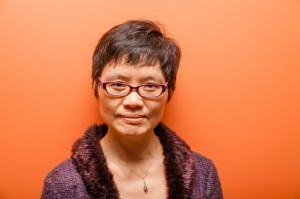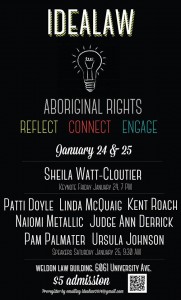
Photo by Steven Richards, The Ubyssey
Sarah Bigam, The Ubyssey, January 15, 2014– The B.C. Human Rights Tribunal has dismissed the complaint of a UBC education professor who says she was the victim of racial discrimination.
Jennifer Chan argued she was denied appointment to the David Lam Chair in Multicultural Education, which was granted to a white candidate, in part because she is Chinese-Canadian. The tribunal dismissed her complaint after four years of legal proceedings.
On Dec. 19, tribunal member Norman Trerise determined that, based on the evidence before him, the case had no reasonable chance of success at a hearing.
“There is really nothing to support that race, colour, ancestry or place of origin played a role in the outcome of the selection process,” Trerise wrote.
He determined that the decision likely came down to the differences between the hiring committee and Chan’s definitions of multiculturalism, since “breadth of representation of multicultural education” was a criterion for the position.
Chan asserts that five of the six members of the hiring committee were not experts in multiculturalism.
“It’s huge pity because if [Trerise] had moved the case to hearing, then obviously the crucial thing would have been to hear the experts in the field, which the hiring committee never did,” Chan said.
Chan first brought her complaint to UBC’s Equity Office in 2009 after being denied the position. The office ran an investigation and then dismissed the complaint, which led Chan to bring her case to the tribunal in May 2010.
“I was disappointed all along the way. I think one of the most disappointing things … would be the UBC Equity Office’s way of handling the whole thing.”
Chan alleges that the VP equity at the time, Tom Patch, had hired a friend of his to do the Equity Office review which dismissed her case.
UBC made multiple attempts to have the case dismissed, but in January 2012, the tribunal ruled that Chan’s case would go to a full hearing, which was originally scheduled for September 2013.
In March 2012, UBC applied to the B.C. Supreme Court for a judicial review of the complaint on the grounds that the case had already been dealt with by UBC’s investigation through the Equity Office. The Supreme Court ruled that the tribunal had not considered whether UBC has sufficiently dealt with the complaint and their decision not to dismiss the complaint “was based on a misapprehension of the evidence and on irrelevant factors.” The court directed the tribunal to reconsider its decision.
Chan asked for the tribunal to include in its reconsideration evidence that she had obtained after filing her original complaint, and UBC said it should not consider materials submitted after that point. The tribunal sided with UBC.
Chan said that, had the case gone to hearing, the additional information would have helped her case.
Chan has no plans to continue pursuing this case.
“In terms of the legal realm, it’s really over,” she said.
“Dr. Chan is a respected scholar and a valued member of the UBC Faculty of Education,” wrote UBC director of public affairs Lucie McNeill in an emailed statement. “UBC took her complaint very seriously and investigated her allegations thoroughly under the procedures set out in UBC’s policy on discrimination and harassment.
“The tribunal’s findings in December concur with our own, and that is gratifying.”
Although the complaint was dismissed, Trerise did decide that UBC’s Equity Office investigation was not a proceeding in the legal sense.
“There, we won, and it’s extremely important in the sense that even though this case is dismissed, this part … is going to set a legal precedent for future complaints,” Chan said.
Chan hopes that her case has drawn attention to greater structural issues. In August 2012, only eight per cent of 110 education faculty members belonged to a visible minority. Chan said inexperience in the legal realm, high legal fees and mental health issues caused by stress affected her and may impede others from who file similar complaints.
“We’re talking about a huge structural gap in the Canadian equity scene here. There’s no effective and efficient system for any equity complaint, and for me that is very serious. Canada tends to project this image: we’re a multicultural country, we take equity seriously. I walk through this process — no. This, for me, is a mirage.”
Read More: Ubyssey

 Follow
Follow


Reasonable hostility: Academic freedom & speech under threat #highered #edstudies #criticaled #bced #bcpoli #ubc #yteubc
No disrespect, but… Politic for politic, as faculty and student activism over the last decade was generated in response to administrative measures taken to devalue academic budget lines and increase debt loads, administrators formed policies that shored up their powers to police campus speech and launch investigations. Following an introduction of a Respectful Environment policy in 2008, in anticipation of an upcoming political protest on campus in March 2009, the President of UBC circulated a “Respectful Debate” memo warning students and faculty to “pay special attention to the rules that govern our conduct” for speech. Legislation of respect entangles or snares the left and right in the same finely meshed dragnet attenuating civil liberties. This also recalibrates a network of surveillance media and technologies, challenging nearly all protections in the workplace. Some self-identified centrists or voices of reason welcome the new measures, adopting roles of third persons while reporting to administrators that loose lips sink scholar-ships.
In Canada and the US, these new respectful workplace policies, which anticipate or respond to workplace legislation and court decisions, mean that academic freedom and charter or constitutional rights noticeably contract at the campus gates. Watching postsecondary institution by institution adopt similar respectful workplace policies, the Executive Director of the Canadian Association of University Teachers (CAUT), issued a memorandum in late March 2009 advising vigilance: “the test of ‘disrespect’ identified in these policies is for the most part experiential and subjective – notions like ‘feelings of shame’ or ‘embarrassment’ crop up repeatedly.” He subsequently asserted, “a major problem in Canadian universities is not that too many people are asserting their academic freedom, but that too few are.”
Similar policies in the US are compounded by the Supreme Court’s 2006 Garcetti v. Ceballos opinion that “when public employees make statements pursuant to their official duties, the employees are not speaking as citizens for First Amendment purposes, and the Constitution does not insulate their communications from employer discipline,” reinforcing managerial discretion and prerogative. Although academic freedom remains a special concern of free speech rights and was deferred by the Court in Garcetti, legal analysts such as Harvey Gilmore concur that “Garcetti has now become the definitive statement on a public employer’s discretion in managing office operations, and that discretion includes controlling an employee’s speech made in the scope of the employee’s professional capacity.”
Following legislation in four other provinces, on 1 July 2012 new legislation in BC came into effect through an amendment of the mental disorder section of the Workers Compensation Act. The new amendment in Section 5.1 provides for potential compensation if the disorder
(i) is a reaction to one or more traumatic events arising out of and in the course of the worker’s employment, or
(ii) is predominantly caused by a significant work-related stressor, including bullying or harassment, or a cumulative series of significant work-related stressors, arising out of and in the course of the worker’s employment.
For legal preparation for this legislation now common across Canada, universities such as UBC folded a large scope of potential infractions into their respectful workplace policies. What stands as protection for disability or “mental disorder” and against “bullying or harassment” under the law is extended in higher education policy to common modes of academic speech—commentary and criticism—that might be articulated in the wrong tone.
Offices of Human Resources introducing or monitoring respectful workplace policies oversimplify speech by stressing, “it is not what you say but how you say it that counts.” Repeated in HR across higher education and curiously by some administrators, this folksy maxim come respectful workplace policy draws on centuries of etiquette texts. “Rather than seeing public talk occasions as needing politeness or civility, a better norm” Karen Tracy proposes, “is reasonable hostility.” She effectively hashes out parameters for democratic communicative practice and flips this “aphorism on its head, it is not merely how something is said, but what a person says that matters.”
Only certain types of face-attack are legitimate and desirable in local governance situations. ‘Reasonable hostility’ is the name for acts that are. Reasonable hostility involves person-directed attack; it is remarks that imply disrespectful, undesirable things about others. Targets of reasonable hostility will judge speakers uttering those remarks to be rude, disrespectful, unfair, and so on…. A speaker might be cognizant that his or her remarks may have this effect, but their purpose is to express outrage about a wrong. The speaker sees self’s central aim as witnessing a truth or expressing righteous indignation.
Faculty and students are bookended by a reformalization of academic speech on one side and a normalization of administrative equivocation, deception included, on the other. Can voices of critique and voices of liberty speak together, with reasonable hostility, as a voice of truth? Can the left and right speak (together)?
Read More: Petrina, S. & Ross, E. W. (2014). Critical University Studies: Workplace, Milestones, Crossroads, Respect, Truth. Workplace, 23, 62-71.
Comments Off on Reasonable hostility: Academic freedom & speech under threat #highered #edstudies #criticaled #bced #bcpoli #ubc #yteubc
Posted in Academic freedom, Accountability, Administration, Advocacy, BC Education, Censorship, Commentary, Critical University Studies, Ethics, Faculty, Free speech, Legal issues, Organizing, Solidarity, Student Movement, Students, Unions, Working conditions
Tagged Academic freedom, Administration, Ethics, Free speech, Legal issues, Organizing, Students, Working conditions